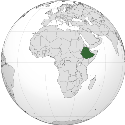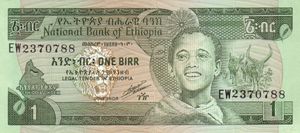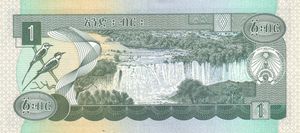Ethiopia

 Ethiopia, officially known as the Federal Democratic Republic of Ethiopia, is a country located in the Horn of Africa. It is bordered by Eritrea to the north, Djibouti and Somalia to the east, Sudan and South Sudan to the west, and Kenya to the south. With over 91,000,000 inhabitants, Ethiopia is the most populous landlocked country in the world and the second-most populated nation on the African continent. It occupies a total area of 1,100,000 square kilometres and its capital and largest city is Addis Ababa. Ethiopia is one of the oldest locations of human life known to scientists and is widely considered the region from which Homo sapiens first set out for the Middle East and points beyond. Tracing its roots to the 2nd millennium BC, Ethiopia was a monarchy for most of its history. Alongside Rome, Persia, China and India, the Kingdom of Aksum was one of the great world powers of the 3rd century. In the 4th century, it was the first major empire in the world to officially adopt Christianity as a state religion. During the late 19th-century Scramble for Africa, Ethiopia was the only African country to defeat a European colonial power and retain its sovereignty as an independent country. It was the first independent African member of the 20th-century League of Nations and the UN. When other African nations gained their independence following World War II, many of them adopted the colors of Ethiopia's flag. In 1974, at the end of Haile Selassie I's reign, power fell to a communist military junta known as the Derg, backed by the Soviet Union, until it was defeated by the EPRDF, which has ruled since about the time of the collapse of the USSR 1991. Ethiopia is a multilingual society with around 80 ethnic groups, with the two largest being the Oromo and the Amhara. The origin of the coffee bean, Ethiopia is a land of natural contrasts; with its vast fertile West, jungles & numerous rivers, the World's hottest settlement in its north, Africa's largest continuous mountain ranges and the largest cave in Africa at Sof Omar.[19] Ethiopia has the most UNESCO World Heritage Sites in Africa. Ethiopia's ancient Ge'ez script, also known as Ethiopic, is one of the oldest alphabets still in use in the world. The Ethiopian calendar, which is seven years and about three months behind the Gregorian calendar, co-exists alongside the Oromo calendar. The majority of the population is Christian and a third is Muslim; the country is the site of the first Hijra in Islamic history and the oldest Muslim settlement in Africa at Negash. A substantial population of Ethiopian Jews, known as Beta Israel, resided in Ethiopia until the 1980s but most of them have since gradually emigrated to Israel. Ethiopia is also the spiritual homeland of the Rastafari movement, which globalized its flag colors worldwide via pop culture and Reggae music. Ethiopia is one of the founding members of the UN, the Non-Aligned Movement, G-77 and the Organisation of African Unity, with Addis Ababa serving as the headquarters of the African Union, the Pan African Chamber of Commerce and Industry, the UNECA, the African Standby Force and much of global NGOs focused on Africa. Despite being the main source of the Nile, the longest river on earth, Ethiopia underwent a series of famines in the 1980s, exacerbated by civil wars and adverse geopolitics. The country has begun to recover recently, and it now has the largest economy by GDP in East Africa and Central Africa.
Ethiopia, officially known as the Federal Democratic Republic of Ethiopia, is a country located in the Horn of Africa. It is bordered by Eritrea to the north, Djibouti and Somalia to the east, Sudan and South Sudan to the west, and Kenya to the south. With over 91,000,000 inhabitants, Ethiopia is the most populous landlocked country in the world and the second-most populated nation on the African continent. It occupies a total area of 1,100,000 square kilometres and its capital and largest city is Addis Ababa. Ethiopia is one of the oldest locations of human life known to scientists and is widely considered the region from which Homo sapiens first set out for the Middle East and points beyond. Tracing its roots to the 2nd millennium BC, Ethiopia was a monarchy for most of its history. Alongside Rome, Persia, China and India, the Kingdom of Aksum was one of the great world powers of the 3rd century. In the 4th century, it was the first major empire in the world to officially adopt Christianity as a state religion. During the late 19th-century Scramble for Africa, Ethiopia was the only African country to defeat a European colonial power and retain its sovereignty as an independent country. It was the first independent African member of the 20th-century League of Nations and the UN. When other African nations gained their independence following World War II, many of them adopted the colors of Ethiopia's flag. In 1974, at the end of Haile Selassie I's reign, power fell to a communist military junta known as the Derg, backed by the Soviet Union, until it was defeated by the EPRDF, which has ruled since about the time of the collapse of the USSR 1991. Ethiopia is a multilingual society with around 80 ethnic groups, with the two largest being the Oromo and the Amhara. The origin of the coffee bean, Ethiopia is a land of natural contrasts; with its vast fertile West, jungles & numerous rivers, the World's hottest settlement in its north, Africa's largest continuous mountain ranges and the largest cave in Africa at Sof Omar.[19] Ethiopia has the most UNESCO World Heritage Sites in Africa. Ethiopia's ancient Ge'ez script, also known as Ethiopic, is one of the oldest alphabets still in use in the world. The Ethiopian calendar, which is seven years and about three months behind the Gregorian calendar, co-exists alongside the Oromo calendar. The majority of the population is Christian and a third is Muslim; the country is the site of the first Hijra in Islamic history and the oldest Muslim settlement in Africa at Negash. A substantial population of Ethiopian Jews, known as Beta Israel, resided in Ethiopia until the 1980s but most of them have since gradually emigrated to Israel. Ethiopia is also the spiritual homeland of the Rastafari movement, which globalized its flag colors worldwide via pop culture and Reggae music. Ethiopia is one of the founding members of the UN, the Non-Aligned Movement, G-77 and the Organisation of African Unity, with Addis Ababa serving as the headquarters of the African Union, the Pan African Chamber of Commerce and Industry, the UNECA, the African Standby Force and much of global NGOs focused on Africa. Despite being the main source of the Nile, the longest river on earth, Ethiopia underwent a series of famines in the 1980s, exacerbated by civil wars and adverse geopolitics. The country has begun to recover recently, and it now has the largest economy by GDP in East Africa and Central Africa.
1 Birr - P41b











